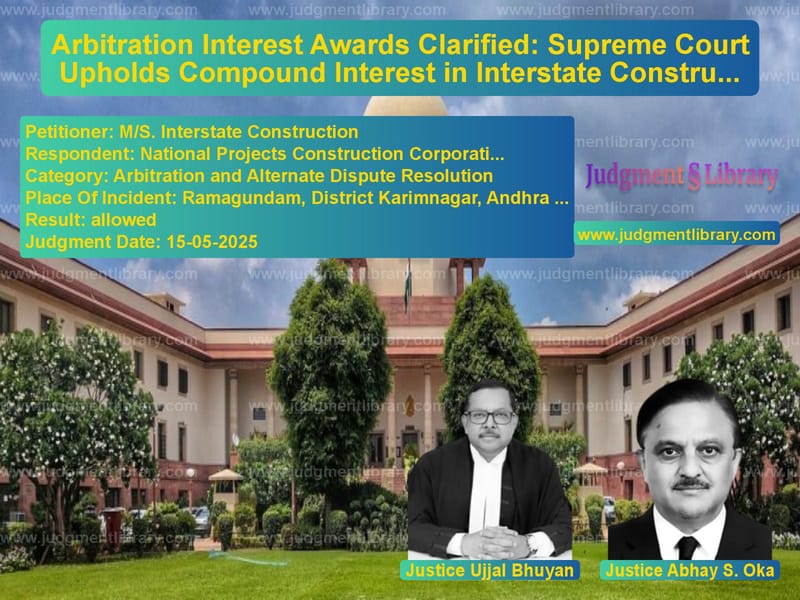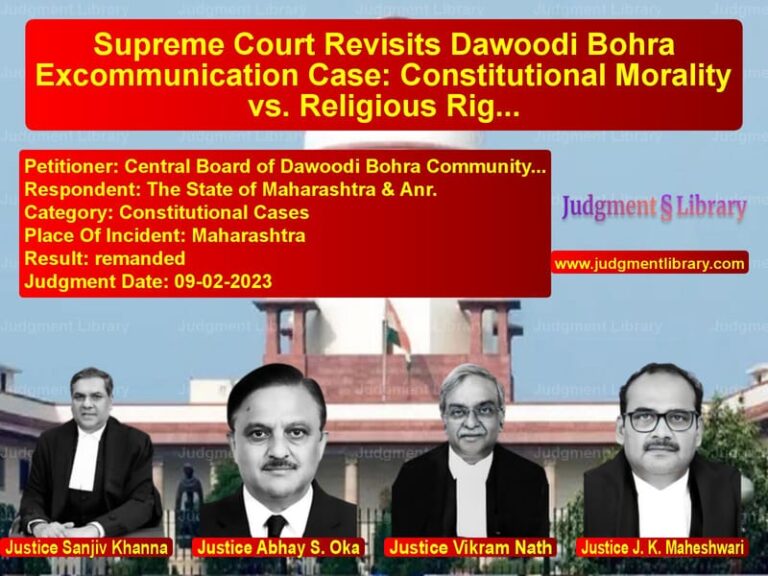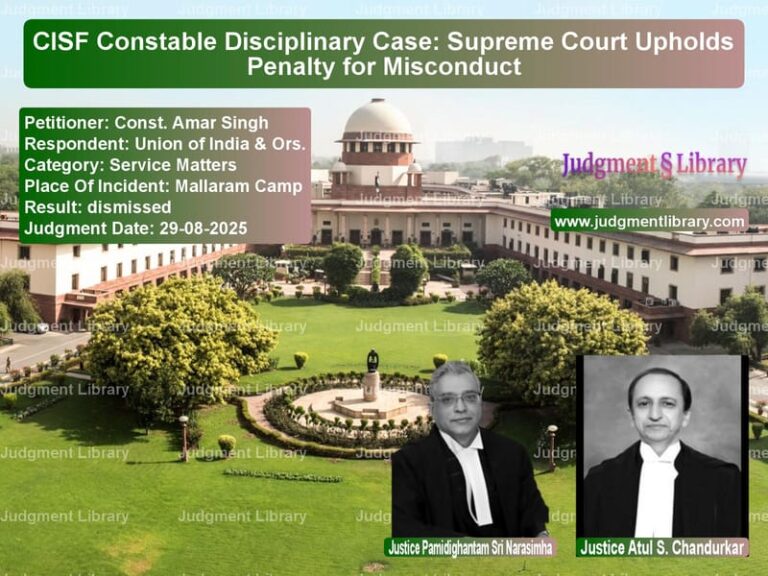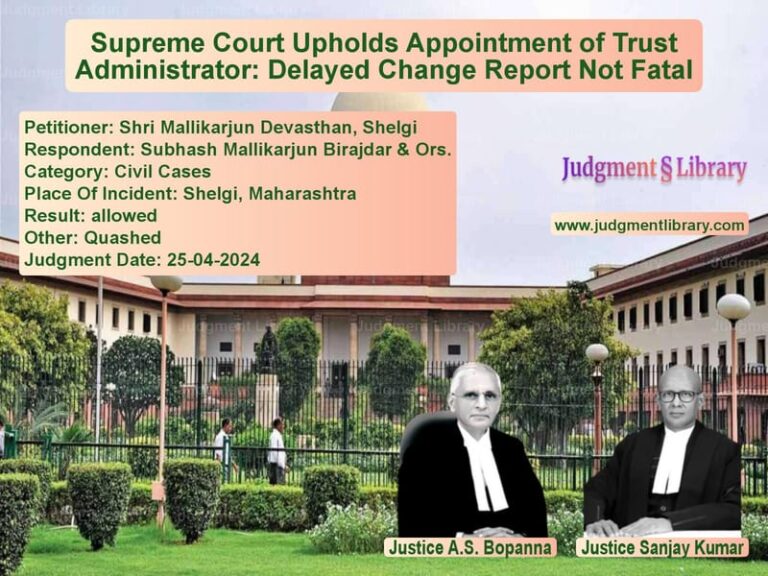Arbitration Interest Awards Clarified: Supreme Court Upholds Compound Interest in Interstate Construction vs NPCC Case
In a significant ruling that clarifies several contentious issues in arbitration law, the Supreme Court of India has delivered a judgment that reinforces the power of arbitral tribunals to award interest in commercial disputes. The case between Interstate Construction and National Projects Construction Corporation Ltd. revolves around a dispute that originated nearly four decades ago, highlighting the prolonged legal battles that can ensue when contractual disagreements remain unresolved.
The story begins in the mid-1980s when NPCC engaged Interstate Construction for work related to the Ramagundam Super Thermal Power Project in what was then the composite state of Andhra Pradesh. Two separate work orders were issued in June 1984 for excavation and foundation package work. The appellant completed the contract work in 1987, but the respondent withheld certain sums on account of recoveries, which the appellant disputed. Additionally, the appellant raised certain claims that the respondent did not accept.
This led to the appellant invoking the arbitration clause through a notice dated May 17, 1993. What followed was a protracted arbitration process marked by delays, multiple arbitrator appointments, and legal challenges at various stages. The initial arbitrator was appointed in 1997, but his mandate was terminated by the High Court in 2004. Subsequent arbitrators were appointed, with the final award being delivered on October 28, 2020, by Mr. Justice R.C. Jain, a former Judge of the High Court.
While the arbitral tribunal allowed claims under several heads, the contentious issue that eventually reached the Supreme Court concerned the payment of interest. The arbitral tribunal had awarded interest under four categories: pre-reference/past period interest from July 1987 until January 19, 1998, at 18% per annum; pendente lite interest from January 20, 1998, until December 31, 2008, at 12% per annum; pendente lite interest from January 1, 2017, until the date of the award at 12% per annum; and future interest from the date of the award until payment at 18% per annum.
The tribunal specifically excluded the period from January 1, 2009, to December 31, 2016, from interest calculation, noting that there was “complete laches on the part of the appellant” during this approximately eight-year period when the appellant failed to diligently pursue its claims.
The respondent challenged the award before the Single Judge of the High Court under Section 34 of the Arbitration and Conciliation Act, 1996. The Single Judge partly allowed the petition by setting aside the award concerning future interest at a rate exceeding 9% per annum but upheld the rest of the award. Dissatisfied, the respondent preferred an appeal before the Division Bench, challenging specifically the directions contained in paragraph 58(b) of the award regarding the computation of interest.
The Division Bench, in its judgment dated August 1, 2023, allowed the appeal and set aside the directions in paragraph 58(b). The High Court based its decision on two primary grounds. First, it held that Section 31(7) of the 1996 Act recognizes only two periods for which interest may be awarded: from the date the cause of action arose until the passing of the award, and from the date of the award until actual payment. According to the Division Bench, the distinction between pre-reference/past period and pendente lite period no longer existed under the 1996 Act. Second, the Division Bench held that the arbitral tribunal committed an illegality by adding interest to the principal amount and then awarding further interest on the compounded sum, which amounted to levying compound interest, which it deemed impermissible.
Aggrieved by this decision, Interstate Construction approached the Supreme Court, leading to the present judgment that addresses these fundamental questions about interest awards in arbitration.
The Legal Framework for Interest in Arbitration
At the heart of this dispute lies the interpretation of Section 31(7) of the Arbitration and Conciliation Act, 1996. This provision deals with the power of arbitral tribunals to award interest and has been subject to varying interpretations over the years. Before delving into the Supreme Court’s analysis, it is essential to understand what this section states.
Section 31(7) reads as follows: “(a) Unless otherwise agreed by the parties, where and in so far as an arbitral award is for the payment of money, the arbitral tribunal may include in the sum for which the award is made interest, at such rate as it deems reasonable, on the whole or any part of the money, for the whole or any part of the period between the date on which the cause of action arose and the date on which the award is made. (b) A sum directed to be paid by an arbitral award shall, unless the award otherwise directs, carry interest at the rate of two per cent higher than the current rate of interest prevalent on the date of award, from the date of award to the date of payment.”
The Division Bench had relied on the case of Sayeed Ahmed and Company Vs. State of Uttar Pradesh to support its conclusion that the distinction between pre-reference and pendente lite interest had disappeared under the 1996 Act. However, the Supreme Court found this reasoning to be flawed.
Justice Ujjal Bhuyan, writing the judgment for the Supreme Court, explained the correct interpretation of Section 31(7)(a): “A careful and minute reading of this provision will make it clear that the arbitral tribunal has the discretion to include in the sum awarded interest at such rate as it deems reasonable on the whole or any part of the money awarded for the whole or any part of the period from the date on which the cause of action arose till the date on which the award is made.”
The Court further elaborated: “This would mean that the arbitral tribunal can exclude a period from the date on which the cause of action arose till the date on which the award is made for the purpose of grant of interest, as has been done in the present case. It would also mean that the arbitral tribunal can grant interest for the whole or any part of the period between the date on which the cause of action arose and the date on which the award is made. It can be a composite period or the said period can be further sub-divided, as done in the present case i.e. from the date of cause of action to filing of the claim and from the date of filing of the claim till the date of the award excluding the period when the appellant was found to be remiss. It would also mean that there can be one rate of interest for the whole period or one or more rates of interest for the sub-divided periods as has been done in the instant case.”
This interpretation affirms the flexibility available to arbitral tribunals in structuring interest awards based on the specific circumstances of each case, including the conduct of the parties during the arbitration process.
The Compound Interest Controversy
The second major issue before the Supreme Court was whether an arbitral tribunal can award interest on interest, effectively resulting in compound interest. The Division Bench had held this to be impermissible, but the Supreme Court found this conclusion to be contrary to established legal precedent.
The Court traced the evolution of the law on this issue, beginning with the case of State of Haryana Vs. S.L. Arora, where a two-Judge Bench of the Supreme Court had held that arbitral tribunals did not have the power to award interest upon interest or compound interest either for the pre-award period or for the post-award period. However, this position was subsequently overruled by a three-Judge Bench in Hyder Consulting (UK) Ltd. Vs. Governor, State of Orissa.
In Hyder Consulting, Justice Bobde (as His Lordship then was), authoring the majority opinion, expressed that the conclusion reached in S.L. Arora did not seem to be in consonance with the clear language of Section 31(7) of the 1996 Act. The majority held that post-award interest can be granted by an arbitrator on the interest amount awarded.
The Supreme Court in the present judgment reaffirmed this position, stating: “The majority view in Hyder Consulting (UK) Ltd. (supra) is that post-award interest can be granted by an arbitrator on the interest amount awarded.”
This view was further reiterated in subsequent decisions, including UHL Power Company Ltd. Vs. State of Himachal Pradesh, Delhi Airport Metro Express Private Ltd. Vs. Delhi Metro Rail Corporation, and Morgan Securities and Credits Private Ltd. Vs. Videocon Industries Limited.
Most recently, in S.A. Builders Ltd., the Court analyzed Section 31(7)(a) and Section 31(7)(b) of the 1996 Act and concluded: “Natural corollary to the above analysis would be that the ‘sum’ so awarded by the arbitral tribunal which may include interest from the date when the cause of action arose to the date of the award, would carry further interest of 18 percent from the date of the award to the date of payment unless the arbitral award otherwise directs (referring to the pre 23.10.2015 position). Thus, the legislative intent is that the awarded sum whether inclusive of interest or not, in case included, then from the date of cause of action to the date of award, would carry further interest from the date of the award to the date of payment.”
The Court explained that the ‘sum’ awarded under Section 31(7)(a) means the principal amount plus the interest awarded from the date of cause of action up to the date of the award. Thereafter, as per Section 31(7)(b), this sum (principal amount + interest) would carry further interest at the statutory rate from the date of the award to the date of payment.
Clarifying the Legal Position
In its judgment, the Supreme Court provided a comprehensive analysis of the legal framework governing interest awards in arbitration, drawing distinctions between the Arbitration Act, 1940, and the Arbitration and Conciliation Act, 1996.
The Court noted that under the 1940 Act, there was no specific provision that empowered an arbitrator to grant interest. However, through judicial pronouncements, the Court had affirmed the power of the arbitrator to grant pre-reference, pendente lite, and post-award interest on the rationale that “a person who has been deprived of the use of money to which he is legitimately entitled has a right to be compensated for the same.”
The 1996 Act marked a significant departure by statutorily recognizing the power of arbitral tribunals to award interest. The Court referred to its recent decision in Pam Developments Private Limited Vs. State of West Bengal, where it culled out several legal propositions highlighting the differences between the 1940 Act and the 1996 Act.
One key distinction noted was that “the wording of Section 31(7)(a) marks a departure from the Arbitration Act, 1940 in two ways: first, it does not make an explicit distinction between pre-reference and pendente lite interest as both of them are provided for under this subsection; second, it sanctifies party autonomy and restricts the power to grant pre-reference and pendente lite interest the moment the agreement bars payment of interest, even if it is not a specific bar against the arbitrator.”
The Court also clarified that while pendente lite interest is a matter of procedural law, pre-reference interest is governed by substantive law. Therefore, “the grant of pre-reference interest cannot be sourced solely in Section 31(7)(a) (which is a procedural law), but must be based on an agreement between the parties (express or implied), statutory provision (such as Section 3 of the Interest Act, 1978), or proof of mercantile usage.”
This nuanced understanding of the legal basis for different types of interest awards provides valuable guidance for arbitral tribunals and courts dealing with challenges to arbitration awards.
Impact and Implications
The Supreme Court’s judgment in Interstate Construction vs NPCC has significant implications for arbitration practice in India. By upholding the arbitral tribunal’s approach to awarding interest for different periods at varying rates, the Court has affirmed the discretion available to tribunals in structuring appropriate relief.
The Court’s endorsement of the power to award compound interest aligns with commercial realities where the time value of money plays a crucial role. As the Court observed in S.A. Builders Ltd., the intention behind awarding pre-award interest is “primarily to compensate the claimant for the pecuniary loss suffered from the time the cause of action arose till passing of the arbitral award.” Similarly, grant of post-award interest “acts as a disincentive to the award debtor not to delay payment of the arbitral amount to the award holder.”
The judgment also demonstrates the Court’s approach to interpreting arbitration law in a manner that promotes efficiency in the arbitration process. By allowing tribunals to exclude periods of delay caused by a party’s negligence from interest calculation, the Court has created an incentive for parties to pursue their claims diligently.
Furthermore, the Supreme Court’s clarification that the ‘sum’ for post-award interest includes both the principal amount and pre-award interest provides certainty to award holders and award debtors alike. This eliminates ambiguity in calculating the amount on which post-award interest is payable.
The Court’s comprehensive analysis of the evolution of the law on interest in arbitration, from the 1940 Act to the 1996 Act and through various judicial interpretations, provides a valuable resource for practitioners and academics alike. The judgment synthesizes multiple precedents to present a coherent and principled approach to interest awards in arbitration.
Conclusion
In setting aside the Division Bench’s judgment and restoring the arbitral award, the Supreme Court has reinforced the autonomy of arbitral tribunals in matters of interest awards. The Court’s interpretation of Section 31(7) of the 1996 Act affirms the flexibility available to tribunals in structuring interest awards based on the specific circumstances of each case.
The judgment also settles the controversy surrounding compound interest by unequivocally stating that the ‘sum’ on which post-award interest is calculated includes both the principal amount and pre-award interest. This position, established in Hyder Consulting and reaffirmed in subsequent decisions, now stands on firm footing.
For parties engaged in arbitration, this judgment underscores the importance of diligently pursuing claims and responding to proceedings in a timely manner. The Court’s approval of the arbitral tribunal’s decision to deny interest for the period when the appellant was remiss serves as a reminder that delay tactics or negligence in pursuing claims can have financial consequences.
Ultimately, the Supreme Court’s decision in Interstate Construction vs NPCC promotes certainty, efficiency, and fairness in the arbitration process—objectives that lie at the heart of the Arbitration and Conciliation Act, 1996. By providing clarity on contentious issues of interest computation, the judgment contributes to the development of a robust arbitration framework in India that aligns with international best practices and commercial realities.
Petitioner Name: M/S. Interstate Construction.Respondent Name: National Projects Construction Corporation Ltd..Judgment By: Justice Ujjal Bhuyan, Justice Abhay S. Oka.Place Of Incident: Ramagundam, District Karimnagar, Andhra Pradesh.Judgment Date: 15-05-2025.Result: allowed.
Don’t miss out on the full details! Download the complete judgment in PDF format below and gain valuable insights instantly!
Download Judgment: ms.-interstate-cons-vs-national-projects-co-supreme-court-of-india-judgment-dated-15-05-2025.pdf
Directly Download Judgment: Directly download this Judgment
See all petitions in Arbitration Awards
See all petitions in Arbitration Act
See all petitions in Commercial Arbitration
See all petitions in Enforcement of Awards
See all petitions in Judgment by Ujjal Bhuyan
See all petitions in Judgment by Abhay S. Oka
See all petitions in allowed
See all petitions in supreme court of India judgments May 2025
See all petitions in 2025 judgments
See all posts in Arbitration and Alternate Dispute Resolution Category
See all allowed petitions in Arbitration and Alternate Dispute Resolution Category
See all Dismissed petitions in Arbitration and Alternate Dispute Resolution Category
See all partially allowed petitions in Arbitration and Alternate Dispute Resolution Category







